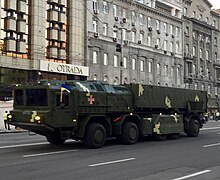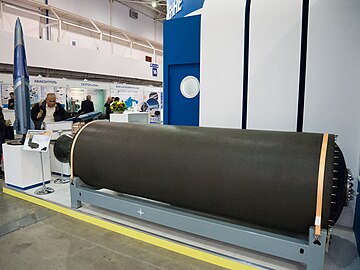Hrim-2
You can help expand this article with text translated from the corresponding article in Ukrainian. (August 2022) Click [show] for important translation instructions.
|
| Hrim-2 | |
|---|---|
 Scale model of Hrim missile on display in 2016 | |
| Type | Tactical ballistic missile |
| Place of origin | Ukraine |
| Service history | |
| In service | Not announced |
| Used by | Ukrainian Ground Forces |
| Production history | |
| Manufacturer | KB Pivdenne |
| Specifications | |
| Warhead | 500 kg (1,100 lb) |
| Engine | Single-stage solid propellant |
Operational range | 50 km (31 mi) – 400–500 km (250–310 mi) |

Hrіm-2, Grom or OTRK Sapsan (Ukrainian: ОТРК "Сапсан", lit. 'peregrine falcon'),[1] also known as Operational-Tactical Missile System Hrim (Ukrainian: Оперативно-тактичний ракетний комплекс «Грім», romanized: Operatyvno-taktychnyi raketnyi kompleks "Hrim", lit. 'thunder'), is a Ukrainian short-range ballistic missile system being developed by KB Pivdenne and PA Pivdenmash, designed to combine the features of a tactical missile system and a multiple rocket launcher. The original Sapsan version of the missile, for Ukraine's own use, was to have a range of 500 kilometers.[2] The later Hrim-2 version, developed for export, has a range limited to 280 kilometers, in order to fall within the 300-kilometre limit set by the Missile Technology Control Regime, which seeks to limit the proliferation of missiles and missile technology.[3]
History
Background
In 2006 the National Security and Defense Council of Ukraine recognised the need for a missile system that would be better than Ukraine's aging Soviet Tochka-U, which had a maximum range of 120 km and could only be overhauled and upgraded by Russian companies. KB Pivdenne was given the task of developing a new missile designated the "Sapsan". The Ministry of Defence and Pivdenne agreed on operational requirements in September 2007. Funding for the project was halted in 2009–2010, following the global financial crisis of 2007–2008, then resumed in November 2011, albeit at a low amount, before being terminated in 2013.[4]
In 2011 arms dealers started offering foreign customers a new missile system called "Hrim",[further explanation needed] and after two years, Pivdenne was contracted by an undisclosed country to develop the Hrim-2. In 2014, after the Russo-Ukrainian War had begun, Pivdenne proposed restarting the Sapsan project, using its experience developing the Hrim-2, with a view to having Sapsan ready for evaluation by 2018. The government agreed.[4]
Hrim
Work on Hrim-2 was announced at the Arms and Security exhibition in Kyiv in 2014. In 2016 it was reported that Saudi Arabia had provided US$40 million for the research and development.[5][6] A photograph of the chassis of a Hrim-2 transporter erector launcher appeared in May 2017; each vehicle could carry and launch two missiles.[7] In April 2019 it was announced that two Hrim-2 prototypes had been produced, one for testing by Saudi Arabia and the other to be tested by the Armed Forces of Ukraine. Saudi Arabia was expected to test their test article one later in 2019, with the system planned to enter service in 2022.[8] [9] In October 2020, it was announced that US$300 million would be needed to complete the testing of Ukraine's prototype.[10] In February 2021 the government decided to sign a contract to fund the production of a test battery consisting of two transporter erector launchers, two loading machines, and two control units (one for the battery commander and the other for the division commander).[11] The contract had not yet been signed by April of 2021, but the Ministry of Defense hoped to do so in 2–3 months.[12][needs update]
In June 2023, the then Ukraine Minister of Defense Oleksii Reznikov stated that the funds needed for completing the program had been approved and allocated.[13]
In August 2024, Ukraine claimed to have successfully tested its first domestically-produced ballistic missile. While the specific missile-type was not disclosed, some commentators have speculated that the missile being referred to is the Hrim-2.[14]
On 1 November 2024, media reported a claim by head of Ukrainian NATO delegation Yehor Cherniev that the Hrim-2 missile is nearly operational. The “single-stage, solid-fuel” ballistic missile reportedly has a 500 kg (1,100 lb) warhead and range up to 500 km (310 miles).[15]
Operational history
Russo-Ukrainian War
Several large explosions occurred at Saky airbase at Novofedorivka in Russian-occupied Crimea, 220 km from the frontline, on 9 August 2022. The cause was unclear, but several media outlets discussed the possibility it was Hrim-2.[16]
On May 6, 2023, Russian officials claimed that their air defenses shot down two Hrim-2 missiles over Crimea, without them causing casualties or damage. The Institute for the Study of War, a Washington-based think tank, noted that the officials did not specify the Hrim-2's target and that Russian sources amplified footage of alleged Hrim-2 remnants in a field.[17]
Gallery
References
- ^ Trevithick, Joseph; Rogoway, Tyler (9 August 2022). "Does Ukraine have a stash of domestically developed ballistic missiles?". The Warzone. The Drive.
- ^ Mikhnenko, Anton (26 April 2019). "Ukraine expands its missile capabilities". The Ukrainian Weekly. Eurasia Daily Monitor. Retrieved 29 November 2022.
- ^ "Grom short-range ballistic missile (SRBM)". GlobalSecurity.org.
- ^ a b Zghurets, Serhiy (14 February 2019). "A burst of "Thunder"". Defense Express. Retrieved 28 November 2022.
- ^ "Ukraine unveils new Grom-2 short-range ballistic missile". Army Recognition. 3 January 2018. Retrieved 28 November 2022.
- ^ "Ukraine unveils new Hrim-2 short-range ballistic missile (photos, video)". UNIAN. 3 January 2018.
- ^ "Вражаючі фото вітчизняного ракетного комплексу "Грім-2"" [Impressive photos of the domestic missile complex "Hrim-2"]. Mil.in.ua (in Ukrainian). Ukrainian Military Center. 2 January 2018. Retrieved 28 November 2022.
- ^ "Виготовлено дослідний зразок ОТРК для випробувань ЗСУ" [A pilot sample of OTRK was produced for testing by the Armed Forces]. Ukrainian Military Pages (in Ukrainian). 22 April 2019. Retrieved 28 November 2022.
- ^ "Russia claims downing of Ukrainian Hrim missile, but does it exist? — BBC News Ukraine". Yahoo! News. 31 March 2023. Retrieved 7 May 2023.
- ^ "На завершення випробувань ОТРК потрібно 300 млн доларів" [300 million dollars are needed to complete the OTRK tests]. Mil.in.ua (in Ukrainian). Ukrainian Military Center. 12 October 2020. Retrieved 1 December 2022.
- ^ "Міноборони цього року придбає дивізіон ОТРК «Сапсан»" [The Ministry of Defense will acquire the OTRK "Sapsan" battery this year]. Ukrainian Military Pages (in Ukrainian). 19 February 2021. Retrieved 28 November 2022.
- ^ "Олександр Миронюк: в 2021 році у війська буде поставлено понад 30 тисяч найменувань ОВТ" [Oleksandr Myronyuk: in 2021, more than 30,000 types of anti-terrorist weapons will be supplied to the military]. Defense Express. 16 April 2021. Retrieved 29 November 2022.
- ^ "Ukraine develops its own long-range missile". Militarnyi. Retrieved 13 June 2023.
- ^ Trevithick, Joseph (2024-08-27). "Ukraine Says It Has Tested A New Domestically-Designed Ballistic Missile". The War Zone. Retrieved 2024-08-28.
- ^ Axe, David (2024-11-01). "Ukraine is about to get a missile that could kill Putin". telegraph.co.uk. Retrieved 2024-11-02.
- ^ "Explosion in Crimea: What weapons Ukraine might have used in the attack in Novofedorivka". www.tylaz.net. 2022-08-10. Archived from the original on 2022-08-13. Retrieved 2022-08-11.
- ^ "Russian Offensive Campaign Assessment, May 6, 2023". ISW. Retrieved 2023-05-07.







